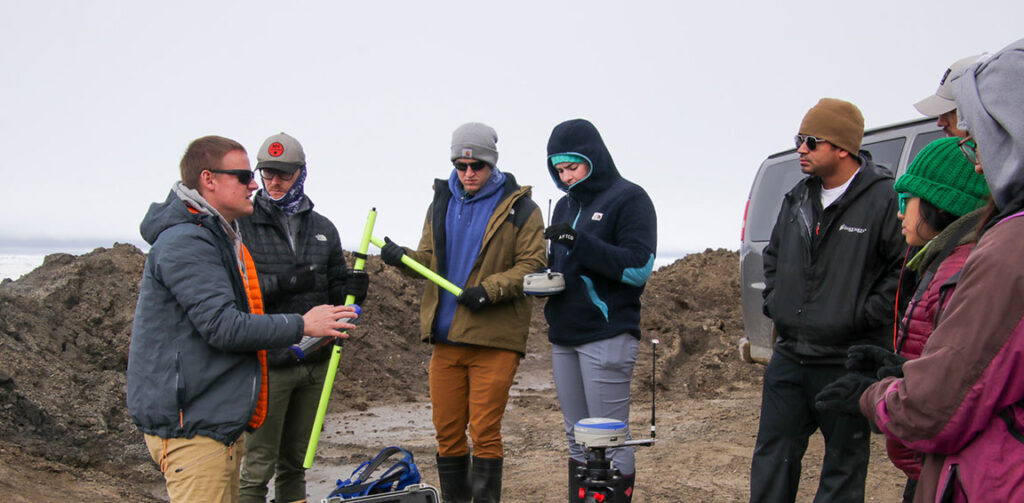University of Alaska Anchorage students in the 2023 Arctic Summer Internship Program in Utqiaġvik gain hands-on learning experience from researchers studying the Arctic. ADAC-ARCTIC COE
THE WATCH STAFF
Nearly 200 people gathered in April 2024 to celebrate the opening of the Arctic Domain Awareness Center (ADAC)-ARCTIC Center of Excellence (COE) for Homeland Security at the University of Alaska Anchorage. The ribbon-cutting and reception featured a ceremonial lighting of the seal oil lamp by former ADAC Fellow Caitlyn Hanna and a fireside chat with a panel that included Dimitri Kusnezov, the Department of Homeland Security’s (DHS) under secretary for science and technology; former Alaska Lt. Gov. Elisabeth “Liz” Qaulluq Cravalho, and Larry Hinzman, White House Office of Science and Technology policy assistant to the director for polar sciences. The Lapquinm Gumilgit Gagoadim Tsimshian Dancers performed before the breaking of an ice ribbon with an ice ax — “an Arctic-appropriate” custom in lieu of a ribbon-cutting, according to a Facebook post from the center.
The ADAC-ARCTIC COE was selected by the DHS in January 2024 to be hosted by the University of Alaska. The federal agency will provide the ADAC-ARCTIC Center with $46 million over 10 years, according to a DHS news release. “The ADAC-ARCTIC COE will affect major DHS mission priorities by focusing on critical research needed to prepare for and implement effective responses to challenges facing the Arctic domain,” Kusnezov said, according to a DHS news release announcing the center. “The Arctic’s dynamic ecosystem has proven to be an extraordinary challenge, and DHS is fortunate to leverage the expertise of academia to meet operational requirements.”
The COE will lead academic, industry, government, laboratory, and local and Indigenous community partners to provide rigorous research and education resources for the study of the Arctic and its challenges of a changing climate and landscape and maintaining the international rules-based order of the region. “Working closely with DHS operational components, the ADAC-ARCTIC research portfolio will conduct research and develop multidisciplinary solutions focused on natural and man-made disasters, ice melt and communications infrastructure. Vital insights gained from academic-led innovative research will help the Department adapt operational missions to the complex, evolving Arctic domain,” the release stated. Jeffrey Libby, director of the Applied Environmental Research Center in UAA’s Business Enterprise Institute, Heather Paulsen, Office of Research director of Research Operations, who will serve as the center’s finance director, and Executive Director Leanne Lusk, Capt., U.S. Coast Guard (Ret), will lead the center, according to a University of Alaska Anchorage news release.
The first projects to be tackled by the COE include detecting distressed mariner calls, researching potential sources of renewable, nuclear and Arctic power in the region, and developing environmental models and decision tools. The center will also offer an interdisciplinary Arctic security graduate degree and an ADAC-ARCTIC student fellowship program while continuing to provide opportunities for budding scholars through its highly competitive Arctic Summer Internship Program. These opportunities will be available through new and existing academic programs, the release stated. The center will also offer expanded community engagement and STEM opportunities at federally recognized Minority Serving Institutions across the U.S.
“Through the integration of partners and experts with the homeland security enterprise, UAA stands ready to serve our state, nation and the Arctic through the Center of Excellence for Arctic Homeland Security,” said Dr. Aaron Dotson, vice chancellor for research at UAA, according to the release.

